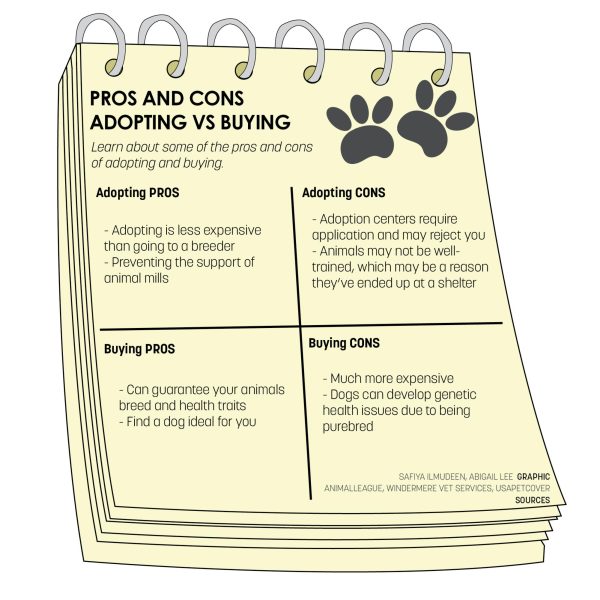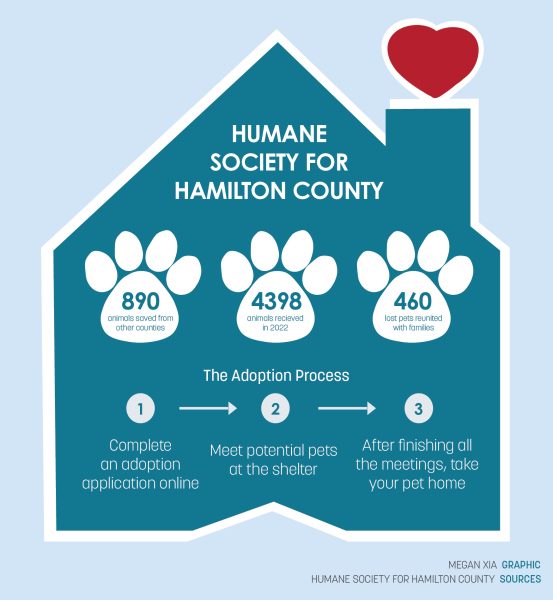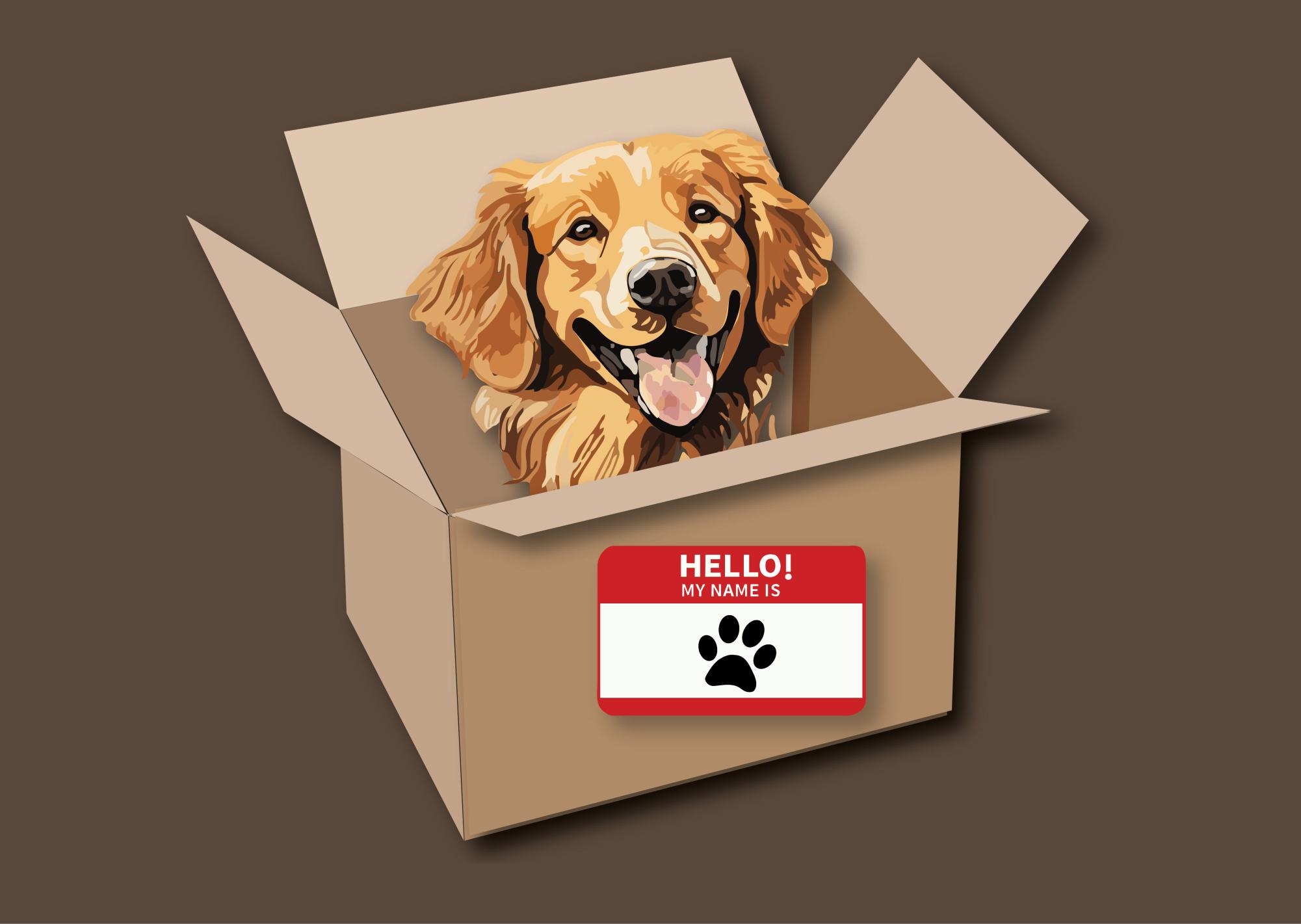As senior Pragathi Arunkumar scrolls through TikTok, she comes across a trend where TikTok users post screenshots of their lock screens and caption it with “your lock screen is what keeps you going.” For most people, their lock screens were pictures of them and their friends or family, but that wasn’t the case for Arunkumar; instead, Arunkumar’s lock screen was a picture of her dog.
“The dog we had in mind was a Shih Tzu and a lot of adoption shelters did not have Shih Tzus that were under 15 years of age and weren’t looking to move into a family just for the purpose of passing away,” Arunkumar said. “So we looked at all of our options and we ended up getting our dog from a breeder.”

Arunkumar is not alone in deciding to get her pet from a breeder. According to a study conducted by the American Pet Products Association, 34% of dogs and 3% of cats are purchased from breeders, while 23% of dogs and 31% of cats are obtained from an animal shelter or humane society. Other ways of obtaining pets included getting them from relatives and friends, getting them from a private party and other various means recorded by survey participants. However, as adoption and buying from a breeder have remained the mainstream options for obtaining a pet, debates about which of those options are better have grown prevalent in the pet-owner community.
Arunkumar said her family decided to get their dog from a breeder due to their lack of experience in owning a dog.
“Because it was our first dog, we felt like if we had adopted a dog that had special needs or something it needed other than regular care, we wouldn’t be the best people to provide that just because we didn’t have that much experience,” Arunkumar said. “It would’ve been unfair for the dog. We honestly didn’t have anything against adopting; we actually did look into shelters and we saw a lot of different dogs, but we did also visit breeders.”
For junior Ava Hoskins, the choice to adopt came by chance.
“We chose to adopt my dog Olive because we found her on the side of the road and we didn’t want to pay for a new dog,” Hoskins said. “We kind of just found her, so we just took her in.”
Lily Darling, community engagement manager for the Humane Society for Hamilton County (HSHC), said there were a lot of factors to consider when individuals choose to adopt their pet or to buy their pet from a breeder.
“I believe many people are motivated to adopt from a shelter because they know they are saving a life,” Darling said. “When you adopt from (a shelter) you are saving two lives—one is the pet you’re taking home, the other is the incoming animal we now have kennel or cage space for. (On the other hand,) people often purchase from breeders or pet stores because they want a desired breed and they feel the only place to find that breed is in a store or at a breeder. ”
financial costs of adopting versus shopping
Tony Dunham, self-proclaimed “adoption advocate” and teacher, said the cost of buying a dog from a breeder versus adopting was a major factor in why he chose to adopt his dog.

“We adopted our dog, mainly because when you look at those breeders’ websites and you look at what they’re charging for a dog—and you know there’s Grace’s Rescue and all these other Indiana rescue (organizations) because people just discard extra dogs that don’t get bought— (we knew) that there was no need for us to go through a breeder because there’s plenty of dogs that need a home,” Dunham said.
Dunham said adopting would be cheaper for pet owners as the pet’s history would, for the most part, be unknown.
“It’s way cheaper to adopt a dog than getting one from a breeder,” Dunham said. “A lot of times, breeders charge prices based on what the mom and dad (of the dog) are, whereas when you adopt a dog, you have no idea their history or whatever, but they’re just a dog, so it doesn’t really matter.”
Darling agreed with Dunham and said she agreed that adopting a pet from a shelter was less expensive than buying from a breeder.
“I do believe there are differences in the financial commitments associated with adopting versus buying from a breeder or a pet store,” Darling said. “When you adopt from HSHC, your pet is spayed or neutered, microchipped, has up-to-date vaccinations and goes home with a starter batch of any medications they may need. When you purchase from a breeder or pet store, the animal is often not spayed or neutered, microchipped or vaccinated,which means the cost to cover those medical expenses now comes out of your pocket.”
Arunkumar said she agreed adoption was cheaper, but it was also important to consider the specific needs of the pet.
“I think the price depends,” Arunkumar said. “I think buying from a breeder is definitely more expensive, but I think the adoption process is more lengthy and if the dog has certain medical requirements or like medical needs, that could add up to a lot more expenses over time, so I think it depends on the dog.”
the desire for physical characteristics
Dunham said a benefit of getting your pet from a breeder is kennel guarantees, certain characteristics that your pet breeder guarantees, such as your pet being healthy at the time of sale or other physical characteristics.
“When you’re buying from a breeder, you have a lot more choice because you’re paying for a pick of the litter, whereas (when you adopt) you just go and see what dogs need a home,” Dunham said. ”If you’re really into purebreds, that seems like why someone would want to (get their pet from a breeder), and then you’re (also) paying for kennel guarantees. So a lot of breeders will get certificates for your dog’s hips, like they’re guaranteed because their parents had good hips, (whereas) when you adopt a dog, you don’t have any guarantees and stuff like that.”
Hoskins said she agreed and said physical characteristics played a large factor in people considering whether to adopt or shop.
“I think that when you are adopting, there’s a lot more factors,” Hoskins said. “When you go (into a shelter), you’re looking for a dog that suits your personality. When you’re looking at breeder dogs, you’re looking for a dog that fits your aesthetic, so you can pick out certain things like eye color or breed.”
Darling said many people chose to buy from a breeder due to wanting a certain breed or certain characteristics but oftentimes, shelters offer pets with the same criteria.
“People often purchase from breeders or pet stores because they want a desired breed and they feel the only place to find that breed is in a store or at a breeder,” Darling said. “To put it simply, that isn’t true. At HSHC we see popular breeds all the time. What people don’t realize is there are opportunities to find the breed they want, at an affordable cost, by adopting a shelter pet.”
the ethical side of the debate
Dunham said despite the benefits of buying from a breeder, he would encourage people to try adopting due to unethical breeding practices.
“I think anyone that’s been to a shelter knows about puppy mills or kill shelters, (and) knows a lot of breeding practices—not all breeding practices, but a lot of breeding practices—are unethical, and if you have an opportunity to adopt a dog and give them a home forever, (adoption) seems like the more ethical option,” Dunham said. “I would encourage people, if they were going to go through a breeder, to do their due diligence and research the breeding practices of that breeder and what they do with the extra dogs that don’t get sold. Regardless, I would encourage people to adopt because if you look in the shelters—the Humane Society of Hamilton County, for example—there are plenty of dogs that are in need of homes.”
Darling said she agreed with Dunham and said bad breeding practices were a huge factor to consider when deciding whether to adopt or shop.
“There is no such thing as a perfect breeder and you never know what health or financial concerns you may be bringing home when you choose to select from a breeder or a pet store,” Darling said. “More often than not, animals from breeders are surrendered to us by families who didn’t realize they had health or behavioral concerns that they weren’t prepared to deal with. When you adopt from a shelter, you can rest easy knowing we have temperament-tested that animal, they are vaccinated for a year, they are spayed or neutered, they are healthy and they are microchipped.”
Darling said shelters, HSHC specifically, have a long process for obtaining the pet to ensure the pet’s wellbeing.
“When people go to breeders to meet puppies or kittens, they often go for the cutest one or the one with a certain color they like,” Darling said. “There is very little time spent getting to know the animal or figuring out whether that animal will fit in with their home and family. When you adopt at HSHC, we require all members of the household to come meet the pet before signing adoption papers. If you have a dog in the home and you’re looking to find them a new friend, we ask that you bring in your dog so we can see if the two get along well. Our team has extensive knowledge on every dog and cat in this shelter and we make selections based on an adopter’s lifestyle, this way we know it will be a forever fit.”
Hoskins said she shared a similar sentiment to Darling and Dunham.

“I would totally adopt (if I were to get another pet) because they’re just so cute,” Hoskins said. “(Shelter pets) need homes and there’s so many of them that just need a good place to live.”
Darling said she agreed with Hoskins and said adopting does not only ensure the living space for one animal.
“When you adopt from HSHC (or any other shelter), you save two lives—the one you bring home and the one we are now able to bring in because we have kennel or cage space,” Darling said. “There are homeless animals throughout Indiana who are literally dying for a spot in our shelter because we are (a) no-kill (shelter), which means we do not euthanize for time, space, breed, disability, or age. When people adopt, we now have the space to rescue animals at risk for euthanasia in surrounding shelters. By adopting from HSHC, you do more than impact the lives of the animals in our building, you have a direct impact on our ability to save animals throughout the state of Indiana.”
Darling said she knew the impact adopting a pet had on the pet from personal experience.
“The love of a shelter pet is unlike any other,” Darling said. “Three years ago, long before I ever thought I’d be working for an animal shelter, I rescued a senior bloodhound. She had been left to die in the hot July sun in the abandoned house next to me. Her fur was matted, her eyes were swollen shut, her nails were overgrown; she had very clearly been neglected. I took her to my local shelter and checked on her every day. When she had recovered and served her mandatory stray hold, I adopted her. This dog was already 10 years old and due to their size, bloodhounds typically live between 10 and 12. I named her Mavis and swore that I would give her the best retirement possible. She had the purest heart and taught me many lessons. When she passed away, I felt a little lost and didn’t really know what to do. I had put so much effort into saving and taking care of this dog whom I only had for a year and a half. I was angry at her former owners for not taking care of her; it wasn’t fair that they got so much time with her and I didn’t. Just before the first anniversary of her death, I saw this job opening at HSHC and I took it as a sign that Mavis wanted me to save other pets like her. I started working here on December 4, 2022, the first anniversary of her death was January 2, 2023. Life works in mysterious ways and the love of a shelter pet is an integral part of that mystery. Everything I do here, I do for Mavis.”
the importance of considering prospective owners’ abilities
Arunkumar said the choice between whether to adopt or shop relies significantly on what the prospective pet owner is looking for.
“I think the most obvious (benefit of adopting) being like, it’s a good deed, you’re taking a dog out of a shelter, or like its poor conditions, its kill shelters, et cetera,” Arunkumar said. “I think the benefits of breeding, though, is if you want a dog for a specific purpose, like if you want a guard dog, or a specific one for your family, (or) you’re just going into (the process) with more of the mentality of you and your family. I think breeding would be a good option for that because you get to pick what you want and you get more flexibility with that, but I think adoption is definitely great to do after your second dog or your third; I think it honestly just depends on your family’s financial abilities and abilities in general.”
Darling said there were lots of resources to help first-time adopters and their new pets.
“There are lots of resources available for new adopters, but the best advice I can give is the 3 by 3 by 3 rule,” Darling said. “A shelter pet takes 3 days to decompress, 3 weeks to learn your routine, and 3 months to finally realize that they aren’t going anywhere. Shelter animals have been through a lot and unfortunately, there is no way for them to tell us. Be patient, be gentle and give them grace.”
Arunkumar said as her family has garnered experience in caring for a dog, they would be more comfortable with adopting if they were to get another dog, but she encouraged prospective pet owners who are debating whether to shop or adopt to do whatever feels right to them.
“I know that my family has been considering getting another dog, and I know we would definitely adopt this time,” Arunkumar said.


